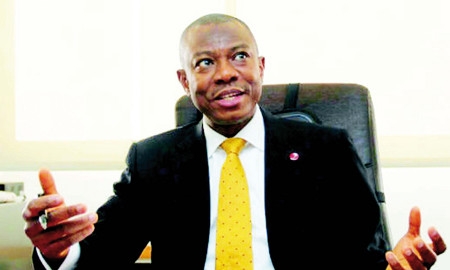Throughout its history,
Sterling Bank has focused more on solutions than branding and consequently built up a base of extremely loyal customers. The bank was originally established in 1960 as NAL Merchant Bank. Being Nigeria’s first merchant bank, it took on a significant portfolio of corporate customers.
“It is safe to say that there is hardly any corporate name that we do not have on our books today. All the mega-deals in the 1960s, 70s, 80s and 90s were completed here,” says Yemi Adeola, Group Managing Director and CEO of Sterling Bank.
NAL Merchant Bank operated as a private company until 1972, when the Nigerian government took ownership. Two decades later, it was partly privatised and then in 2000 the government sold its remaining assets. Over the next few years, the bank was vigilant about balancing its books and maintaining good corporate governance. This meant that by the time the banking sector consolidation phase came along in 2006, it was a strong player that merged with four others to become Sterling Bank.
When the financial crisis came to a head in 2011 and the Central Bank (CBN) instigated far-reaching reforms in the banking sector, Sterling not only passed the stringent stress tests with flying colours, it also acquired the undercapitalised Equitorial Trust Bank, thus enhancing Sterling Bank’s position in the hierarchy of major players.
"The bank encourages a DIY approach in many of its branches, where customers can do everyday transactions on their own"
Yemi Adeola, Group MD and CEO of Sterling Bank |
“When Sterling Bank survived the CBN review, people asked how that was possible. We were one of the smallest banks with the highest costs of funds,” says Sterling Bank’s Chief Financial Officer Abubakar Suleiman. “I said it was because we always believed that there would be a crisis somewhere down the line. And we were ready for it.”
The bank’s strengths lie in a very low non-performing loan portfolio (3 per cent), a robust enterprise risk management framework, a credit assessment process, highly efficient international payment systems, having one of the best trade services organisations in Nigeria and its ability to find and structure flexible solutions.
“We do not have so many customers, so we don’t have the luxury to invest willy-nilly,” says Mr Suleiman. “It is also about how you structure the loan deals, and the additional value involved, that means our customers are best served in the industry.”
Priding itself as the “one-customer bank” that celebrates each and every customer as a unique individual, Sterling Bank’s strategy nowadays is to focus on retail banking.
“Our strategy in essence is to simplify banking at the retail end,” says Mr Adeola. “In each of our regions, we have a hub where all shades of transactions take place. However, we have come to realise that most people in the retail segment just want to do plain vanilla banking. We are helping to make this happen in various ways, such as providing easy-to-do, same-day account opening. We offer various electronic payment solutions, including internet banking and a wide range of cards that allow payments at millions of store outlets as well as withdrawals from ATMs worldwide.”
Mr Suleiman adds that Sterling Bank is conservative yet innovative, an example being its outlook on financial inclusion and bank profits. “We decided to go into the lowest levels of the market with the objective of building the market – it is not just about making profit. You have to begin to treat some of your asset creation as investments. Not all lending will be at market rates, so we will be discounting the rate we charge for some things.”

0 COMMENTS